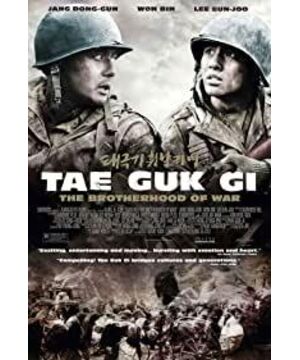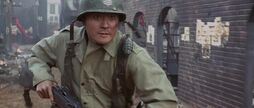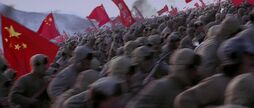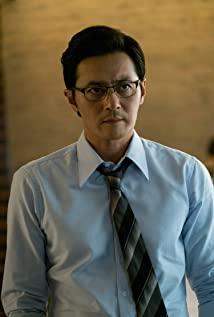The brilliant point of the movie is that the story is told from the perspective of the older brother in the first half, until the climax when the older brother thinks that the younger brother was burned to death, and then turns to the story from the perspective of the younger brother. I think the central idea of the film can be summed up in a sentence the commander asked Taishi, are you doing this for the country or your brother.
Obviously, the older brother has never been for the country. And the younger brother is only for the elder brother from now on.
The film does not explain why the disillusioned brother chose to defect to North Korea. In fact, thinking about it is understandable and does not need to go into detail. Perhaps it is just to increase the need for conflict in the plot, or to further demonstrate the impermanence of the Civil War under the control of pure ideology.
The director said that in the movie, you may see more of how the war will change people's lives and people themselves. But in fact, from another level, my brother is the person who has not been changed by the war. Perhaps he never really embraced the coming and existence of war. In his eyes, there has always been only one goal, that is, to be responsible to his younger brother and to let him go home alive. Comrades-in-arms, loyalty, command, discipline, obedience, these things that should be possessed and accepted on the battlefield, are not reflected in my brother. Apart from his younger brother, he didn't even have any friendship with any of his comrades. In his eyes, as long as there are achievements that can be exchanged for medals, he will work hard for it. So it doesn't matter if he doesn't obey the command, it doesn't matter if his comrade-in-arms sacrifice, it doesn't matter if he shoots an innocent old friend, or even betrays the country. Therefore, he may have a part of the nerve in his brain that gave him an accurate military combat capability, but he never really entered the war, thought about it, and felt it. He mechanically strafed the enemy, numbly completing the task. Or maybe he has already blinded himself, immersing himself in the memories of the good life in the past and the fantasy of a peaceful utopia. Therefore, everything on the battlefield is just a means, and he did not regard it as a destiny that he could not escape after all. As a result, his love and responsibility for his brother turned into blindness and delusion in the end. In his eyes, he only has the responsibility to protect his younger brother, and he does not have any responsibility for others. The military is a place where responsibility and discipline are stricter than anything else. So even after he was finally awakened by his younger brother, he could disregard any general responsibility and shoot his soldiers. In fact, the one who is most reluctant to accept fate is himself. It seems that as long as the younger brother is sent back, it can be regarded as nothing has happened, everything can be attributed to the good old days, and the younger brother can become the hope of the whole family again. This thought became his escape from not looking directly at the war. He didn't realize that he couldn't go back to the past no matter what. He didn't realize that since he was already on the battlefield, it was useless to protect his younger brother as in the past. They came to the battlefield as brothers, but they did not become brothers on the battlefield. The older brother's anti-enemy and escape skills are obviously stronger than his younger brother's, but he did not teach his younger brother how to accurately kill the enemy on the battlefield or get away with it. Of course, in his heart, he did this to protect his younger brother. They could have supported each other and fought together, but the end result is that the misunderstanding between the two deepened. The elder brother did not realize the growth and change of the younger brother, and did not realize that what is really needed on the battlefield is the spiritual gap.
Compared with the elder brother, the younger brother is the one who truly accepts the war and has been changed by the war. From the timid at the beginning to the mature and steady at the end. Indeed, at the beginning, my brother was the child who cried and wanted to go home, the weak who needed to hide behind his brother and was afraid, and the recruit who was overwhelmed and panicked after his arm was scratched by shrapnel. But he finally accepted the fact that the war was coming and that he was recruited. He learned to understand the way of war and cherished getting along with his comrades. In the end, he became the one who understood the word responsibility better. He told his brother that if he saw his sacrifice, it would be meaningless to go back alive. If the older brother dies, what happens to his fiancee and younger siblings. It was the younger brother who realized that the real responsibility is not one side blindly favoring and protecting the other, the real responsibility is that the two take care of each other and are responsible to all who care about them and love them. The ruthlessness of life and death on the battlefield has taught the younger brother to turn small love into great love, and the responsibility is far beyond the scope of the two brothers. So he is the embodiment of the film's humanity. He truly did not be swayed by the simple relationship between the enemy and ourselves on the battlefield, and he saw the kindness and simplicity of the original intention in the hail of bullets. After many battles, he eventually became an excellent fighter. Without the protection of his brother, he can still be on his own and challenge the enemy. When his sister-in-law was arrested, he still escaped by himself. Even in the end, he was still tenacious enough to come to the enemy camp alone and fight all the way until he saw his brother.
What is needed on the battlefield is a persevering belief. With this belief, a soldier who can support his body even if his body is crushed can still move forward bravely. It can be said that the belief of the elder brother is stingy and paranoid, and the belief of the younger brother is the firmness of the atmosphere. Although they are brothers, they grew up in very different psychological environments and patterns. So it's not who is right or who is wrong. Both beliefs can keep them alive. The elder brother cannot die for the sake of the younger brother, and the younger brother cannot die for the sake of everyone. Both brothers grew up in the war, and both were excavated by the war. Therefore, when the elder brother thought that his younger brother had died, and found that his only belief, only escape, and only spiritual sustenance no longer existed, the whole person was truly defeated by the war and absorbed his spiritual energy, and became a shell of a mechanical battle. And he finally paid the price for his paranoia. If he hadn't insisted on going his own way, holding the mentality of protecting his younger brother, and desperately strafing the banner army at the end, he might have been able to leave alive with his younger brother. These changes and injuries are undoubtedly brought to them by this unpopular war.
Apart from the fraternal humanity that has been handled so delicately, there are two lines that particularly impressed me. One is when a soldier complains, is ideology really that important? This is not the same as the War of Resistance Against Japanese Aggression, which is fought by our own people. In another place, another soldier hiding in the trenches said in the face of the artillery fire, stop bombing, my ears are ringing. Different from previous war movies, what we see here is not a well-trained army, not a single-minded soldier, what we see is a group of ordinary people who are forced to go to the front and don't even know what they are fighting for. man. Who is really doing the wrong thing? Which side really violated the humanitarian taboo? Why are we hitting them? But how can we go home without hitting them. The scene where Young-soo was caught best exemplifies this helplessness. They are all ordinary people in their eyes, and they are the same people they know in memory, but they have to bear the blame that they should not bear for an empty name. Why I am guilty, who can say. The executioner, the victim, who is synonymous with human nature, who has the right to rescue another person. From Entai's point of view, we hope that the officer who shot him will order the release of the CCP bandits, including his younger brother. But as a commander, he was not a poor man who simply obeyed orders, how could he forget his responsibilities because of the threat of his life. Everyone knows what they should do, but not why they do it.
All the high-sounding reasons, all the so-called oaths of glory, lost all the humanity it claimed to be at the moment when the first gunshots of the war broke out. Because war is inhumane. There is no one omniscient and omniscient perspective that will allow us to take care of all boiling lives and sinless souls.
View more about Tae Guk Gi: The Brotherhood of War reviews









